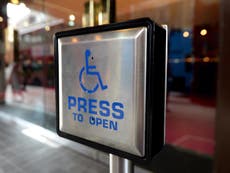'I didn't want to live': Disabled woman reveals physical and mental struggle of living without a wheelchair
‘The loneliness of not being able to go see people and having a chronic illness is very overwhelming. It’s not just the physical pain – it’s psychological and emotional’
Until recently Felicia rarely left her house. Suffering from osteoarthritis, the 48-year-old struggled to walk without assistance. Yet she was unable to find an affordable wheelchair.
“It greatly curtailed my independence,” she tells The Independent from her south London home. “I became increasingly immobile because of my chronic pain and fatigue, which has gotten much worse in the last few years.”
Felicia pauses, tearing up.
“I didn’t want to live,” she continues. “The loneliness of not being able to go and see people, and having the chronic illness on top of that, is very overwhelming.
“It’s not just the physical pain – it’s psychological and emotional.”
Felicia is one of more than 3 million people in the UK who need a wheelchair but, according to new research by the British Red Cross, are unable to access one.
In a report published today, the charity warns of a “postcode lottery” in mobility aid provision, which they say is leaving many injured and ill people “trapped in their homes”.
After a number of years struggling without a wheelchair, Felicia, with help from the British Red Cross, obtained one in March.
Her daughter, 23-year-old Kosiwa, who visits her mother every few weeks, says not having a wheelchair trapped her mother in a “vicious cycle”.
“She was in a lot of pain – if you’re not able to get out and see your friends and do the things that are important to you, it makes things worse,” she says.
“When the pain is so bad it’s hard to be able to do anything. Having the wheelchair there and knowing that she’s got that has been helpful. It’s really increased her confidence.”
Reflecting on how the wheelchair has helped her, Felicia says she is now able to go out on her own – which she was unable to do before.
With a smile, she adds: “It’s my lifeline.”
Subscribe to Independent Premium to bookmark this article
Want to bookmark your favourite articles and stories to read or reference later? Start your Independent Premium subscription today.




Join our commenting forum
Join thought-provoking conversations, follow other Independent readers and see their replies
Comments